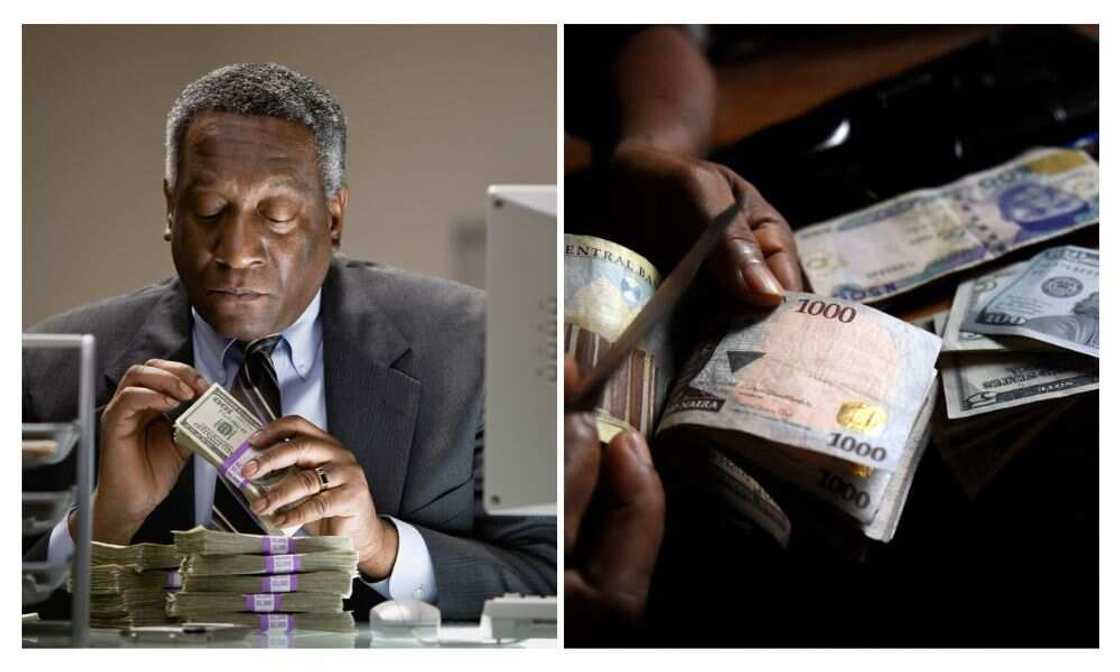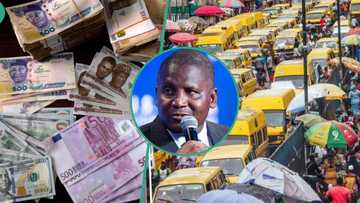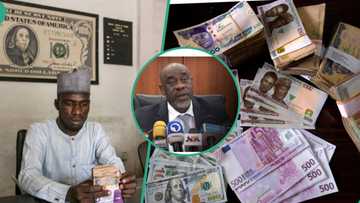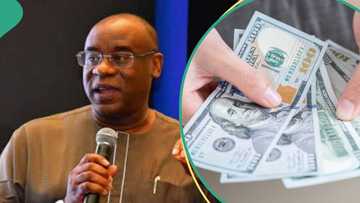Naira Crashes to a new low of N910/$ as CBN Piles Pressure on BDCs, Warns Speculators And Banks
- Nigeria's local currency, the naira, fell against the US dollar on Tuesday, August 22, 2023
- On the black market, the dollar crashed to N900 to a dollar and N770.72 at the official FMDQ exchange
- The development follows accusations by CBN and Forex operators that International Money Transfer companies divert dollars to the black market
After days of showing some strength at both the official and parallel markets, the naira crashed again from N885 to a dollar to N910 per dollar at the black on Friday, August 25, 2023.
The development comes as buyers flood the parallel market searching for dollars for travel, school, and imports.

Source: Getty Images
Naira falls at official market as buyers flood black market
Also, at the Investors and Exporters (I&E) window, the naira traded at N770.72 to a dollar as against the N739.63 it traded on Thursday, August 24, 2022.
PAY ATTENTION: Join Legit.ng Telegram channel! Never miss important updates!
The recent fall of the naira comes two weeks after the Central Bank of Nigeria (CBN) acting governor, Folashodun Shonubi, revealed that the apex will deal with currency speculators to stop the naira's free fall.
A few days after Shonubi's statement, the local currency strengthened at the official and parallel markets.
According to reports, the Central Bank of Nigeria (CBN) barred bank CEOs and top officials of commercial banks in Nigeria from leaving the country between August 5 and 15, 2023, so they could answer questions on forex infractions.
Reports by The Nation reveal that bank executives sold their foreign exchange at high costs following the decision to unify the exchange rates.
The newspaper quotes sources as saying that the beneficiaries of the naira crash were bank chief executives who held sway and sold dollars at will.

Read also
N860/$: Over 2000 Nigerians drop off dollar millionaire list, more at risk as naira depreciation continues
They say that before the emergence of Tinubu as President, bank chiefs dispensed forex among families, friends, and cronies, which contributed to delays in accessing cash and foreign exchange by bank customers.
Per the report, after the CBN allocated FX to the banks, the banks' CEOs and top officials engaged in round-tripping, money laundering, and other unethical practices.
CBN blames bank CEOs, MDs for round-tripping
The source said that the apex bank lifted the travel ban on Tuesday, August 15, 2023, against bank MDs and CEOs after the Acting Governor of CBN's meeting with President Tinubu.
Before now, CBN gave weekly Forex allocations to commercial banks to meet legitimate demands, urging fair transactions to purchase FX from banks with minimal documentation.
The commercial banks had 48 hours to settle their customers' foreign exchange demands. They were asked to set up teller points at designed branches across Nigeria to serve Forex requests for PTA and BTA, tuition fees, medical payments, and other transactions.

Read also
“Not more than 2.5%”: CBN releases new rules for 5,691 BDC operators when buying, selling dollars to customers
BDC operators say IMTOs divert dollars to black market
Meanwhile, forex traders in Nigeria, known as Bureau de Change Operators, have noted that most transfers conducted by International Money Transfer Operators (IMTOs) are diverted and never tracked.
Their position is the same as CBN's, which traced the naira's abysmal performance against the US dollar to diverting diaspora remittances to the black market.
According to the President of the Association of Bureau de Change Operators, Aminu Gwadebe, most funds are diverted by unlicensed online companies.
Naira experiences biggest fall, trades for N870 per dollar as CBN pegs exchange as N770.889/$ on website
Legit.ng reported that the naira has plummeted to an all-time low of N870 per dollar at the parallel market as the gap between the official and similar markets grows wider.
According to traders who spoke with Legit.ng on Friday, July 21, 2023, more people are chasing the US dollar for summer travel, imports, and school fees.
Legit.ng findings show that the situation is exacerbated by a new regulation by the Central Bank of Nigeria (CBN) requiring that commercial banks and other financial institutions demand Tax Clearance Certificates from FX seekers, forcing Forex seekers to flood the black market in search of dollars.
Source: Legit.ng



